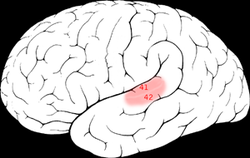Cognitive neuroscience of music
Cognitive neuroscience of music is the scientific study of
brain-based mechanisms involved in the cognitive processes underlying
music. These behaviours include music listening, performing, composing,
reading, writing, and ancillary activities. It also is increasingly
concerned with the brain basis for musical aesthetics and musical
emotion. Scientists working in this field may have training in cognitive
neuroscience, neurology, neuroanatomy, psychology, music theory,
computer science, and other allied fields.
Cognitive neuroscience of music is distinguished from related fields such as
music psychology,
music cognition and
cognitive musicology in its reliance on direct observations of the brain, using such techniques as
functional magnetic resonance imaging (fMRI),
transcranial magnetic stimulation (TMS),
magnetoencephalography (MEG),
electroencephalography (EEG), and
positron emission tomography (PET).
Music psychology
Music psychology, or the psychology of music, may be regarded as a branch of
psychology or a branch of
musicology.
It aims to explain and understand musical behavior and musical
experience. Modern music psychology is mainly empirical:
music-psychological knowledge tends to advance primarily on the basis of
interpretations of data about musical behavior and experience, which
are collected by systematic observation of and interaction with human
participants. Music psychology is a field of research with practical
relevance for music performance,
music composition,
music education,
music medicine, and
music therapy.


 00.18
00.18
 Jojo_deep
Jojo_deep


 Posted in:
Posted in: 

0 komentar:
Posting Komentar